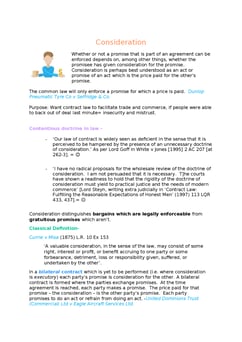Barclays Bank plc v O’Brien [1993] QB 109
Judgement for the case Barclays Bank plc v O’Brien
Table Of Contents
KEY POINTS
If a person is led to engage in a transaction due to the undue influence exerted by another party (the person at fault), they have the right to invalidate that transaction against the party who exerted the undue influence.
The bank was on inquiry as to the possibility of undue influence because of the significant power imbalance between the parties. The bank had a duty to ensure that Mrs. O'Brien fully understood the implications of the transaction. Failure to properly inform a non-client guarantor about the nature and effect of the transaction could render it voidable.
FACTS
Mr. and Mrs. O’Brien jointly owned their home, which was mortgaged. Mr. O'Brien had ties to a company with financial troubles, and the bank sought to secure the company's debt by raising their overdraft limit and having Mr. O'Brien guarantee it. They also required a legal charge on the couple's home to secure the guarantee. However, there were procedural errors in informing the couple about the legal documents.
Mr. O'Brien signed the documents without issue. Later, Mrs. O'Brien signed a legal charge and a side letter at the bank, even though she received no proper explanation of the documents' contents and didn't read them. This led to the home being used as collateral for the company's debt.
The company's financial situation deteriorated, and the bank demanded repayment from Mr. O'Brien. Possession proceedings were initiated against both Mr. and Mrs. O'Brien when the demand was not met. Mrs. O'Brien defended the proceedings, alleging that Mr. O'Brien's undue influence and misrepresentation induced her to sign the legal charge.
The trial court found in favour of the bank, rejecting the claim of undue influence but recognizing Mr. O'Brien's misrepresentation. Despite this finding, the court granted an order for possession against Mrs. O'Brien, asserting that the bank wasn't responsible for Mr. O'Brien's misrepresentation.
JUDGEMENT
Appeal was dismissed. The court found in favour of Mrs. O’Brien, stating that her husband did exercise undue influence on her.
COMMENTARY
This case highlights the importance of transparency, fairness, and informed consent in financial transactions, particularly when vulnerable individuals are involved.
The decision underscores the duty of banks to ensure that individuals fully understand the agreements they are entering into, and it has had a lasting impact on how financial institutions interact with guarantors and non-client individuals in similar circumstances.
ORIGINAL ANALYSIS
O was a shareholder in a business and negotiated an overdraft for which he would be liable, the result being that O and W’s (his wife) home would be subject to a charge, but the bank never told W of this. When the company went bust the bank sough to enforce this.
W protested on the grounds that O had put undue influence on her to agree to the arrangement.
HL held that there was undue influence and therefore the charge on the matrimonial home was set aside.
Lord Browne-Wilkinson
-
There are 2 classes of undue influence:
“Actual undue influence”, where the claimant has to prove that the wrongdoer exerted undue influence on her to enter the transaction;
“Presumed undue influence”, where, once the claimant shows that there was “a relationship of trust and confidence of such a nature that it is fair to presume that the wrongdoer abused that relationship in procuring the complainant to enter into the impugned transaction”. Once this has happened the burden is on D to show otherwise [class 2B]. Certain relationships e.g. solicitor and client, doctor and patient etc (i.e. fiduciary relationships) automatically raise the presumption of undue influence, while others can still be shown by the complainant outside these categories [class 2A].
For Further Study on Barclays Bank plc v O’Brien

Contract law notes fully updated for recent exams at Oxford and Cambrid...
Need instant answers? Our AI exam tutor is here to help.
Ask questions 🙋 Get answers 📔 It's simple 👁️👄👁️
Our AI is educated by the highest scoring students across all subjects and schools. Join hundreds of your peers today.
Get StartedSimilar Cases
Related Product Samples
These product samples contain the same concepts we cover in this case.
| Contract Law | Royal Bank Of Scotland V Ettridge Notes (3 pages) |
| Contract Law | Undue Influence 1 Notes (12 pages) |
| Contract Law | Undue Influence And Unconscionability Notes (13 pages) |

 Since 2010, Oxbridge Notes has been a trusted education marketplace, supplying high-quality materials from top achievers at universities like Oxford, Cambridge, LSE, Harvard, and Yale.
Since 2010, Oxbridge Notes has been a trusted education marketplace, supplying high-quality materials from top achievers at universities like Oxford, Cambridge, LSE, Harvard, and Yale.